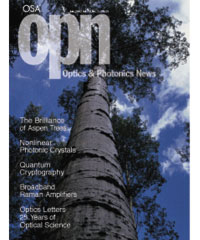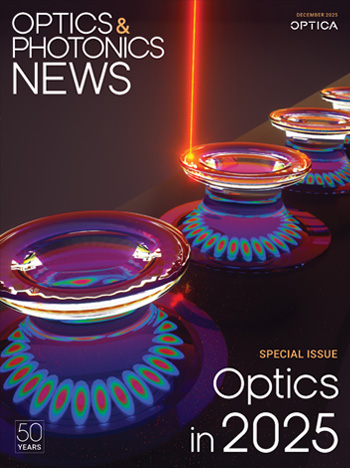
July 2002 Issue
- Reflections on the Brilliance of Aspen Trees
- The Fitzpatrick Center for Photonics
- Quantum Cryptography
- The Impact of Optics Letters on Science and Technology
- In the Words of the Optics Letters Editors
- Nonlinear Photonic Crystals Toward All-Optical Technologies
- Broadband Raman Amplifiers
- Browse all Issues
Feature Articles
Reflections on the Brilliance of Aspen Trees
Each fall, the aspen trees in Colorado undergo remarkable changes in color. Depending on the lighting and viewing angle, the colors range from pale to bright yellow. A detailed study of this observation reveals that aspen trees viewed with back-lighting are more brilliant yellow than those viewed with front-lighting.
by R. Brian Hooker and Jack D. GaskillThe Fitzpatrick Center for Photonics
Multidisciplinary engineering learning centers, in which optics is used to address application areas ranging from biology to telecommunications, have been established by a number of U.S. universities in recent years. Duke and Stanford are the latest to announce specialist centers for research and teaching in photonics, with construction starting as soon as this year and completion between 2004 and 2005. Last year, in a joint communiqué, the schools announced receipt of equal donations towards their respective centers of $25 million each, from Michael J. Fitzpatrick and his wife. On each campus new buildings, or parts of buildings, will be named after Fitzpatrick, a telecommunications engineer and businessman who was chairman of E-TEK Dynamics when it merged with JDS Uniphase Corp. in 2000. Fitzpatrick says he hopes his centers will relieve a shortage of trained photonics engineers that "endangers progress" in the field.
by Michael WenyonThe desire to communicate in secrecy is an ancient one: literature surviving from the time of the Roman Empire describes a substitution cipher used by Julius Caesar; earlier Greek writings describe methods used to conceal confidential military and diplomatic communiqués from the eyes of unauthorized readers. Two millennia later, modern concepts of quantum mechanics are being combined with state-of-the-art optoelectronics to provide a truly novel solution to this ancient problem.
by William P. Risk and Donald S. BethuneThe Impact of Optics Letters on Science and Technology
Twenty-five years ago this month, Optics Letters was published for the first time. OPN is proud to commemorate the anniversary of the world's leading optics letters journal with a special section that features an overview of the key developments in optics research reported first in OL, and memoirs written by the journal's editors over the course of the past 25 years.
by Anthony J. Campillo and Anthony M. JohnsonIn the Words of the Optics Letters Editors
This article contains memoirs written by Optics Letters' editors over the course of the past 25 years: Robert Terhune, Peter Smith, Paul Kelley, Anthony Johnson, and Anthony Campillo.
by Robert W.TerhuneNonlinear Photonic Crystals Toward All-Optical Technologies
Photonic crystals, an analog of semiconductors for light waves, are composite periodic dielectric materials that provide novel and unique ways to control many aspects of electromagnetic radiation. Harnessing the nonlinear properties of photonic crystals and photonic-crystal waveguides offers an opportunity to create the all-optical analogs of diodes and transistors that will one day enable the first all-optical computer to be built.
by Sergei Mingaleev and Yuri KivsharInternet traffic has been increasing at a rate faster than what one would expect on the basis of Moore’s law, generating an urgent need for the development of technologies that can serve as an alternative to conventional WDM transmission based on erbium-doped fiber amplifiers (EDFAs). Since the percentage of data traffic exceeds the percentage of voice traffic, networks worldwide must evolve from voice-centric systems to data-centric systems. The trend translates into a need for higher capacity and longer distance transmission than can be supplied by conventional WDM.
Departments and Columns
Are you looking for an alternative Webbrowser? Search no farther than http://www.opera.com, where you can download versions of the Opera browser for Windows, Mac, Linux, Solaris, Symbian OS, QNX, OS/2, and BeOS.
Making Waves with the Optics Suitcase
To generate excitement about optics as a career choice, OSA’s Rochester Section has developed a K-12 presentation, the Optics Suitcase. It’s been on the road, engaging students and teachers alike, since 1999.
The Translation Journal Optics and Spectroscopy
In the years after World War II, OSA began publishing the translation of a Russian optics journal—a key decision in the growth and survival of the society.
The Optics of Semiconductor Diode Lasers
In this article we describe the basic features of the beam of light emitted by a diode laser, and discuss methods to analyze and manipulate this beam.
Also in this Issue


![Manual probe system with needles for test of semiconductor on silicon wafer. [A. Morozov / Getty]](https://opnmedia.blob.core.windows.net/$web/opn/media/images/articles/2025/1125/departments/202511-cover-web.jpg?ext=.jpg)
![Researcher Clara Saraceno in the lab. [Image by Carsten Behler Photography]](https://opnmedia.blob.core.windows.net/$web/opn/media/images/articles/2025/1025/departments/202510-cover-web.jpg?ext=.jpg)
